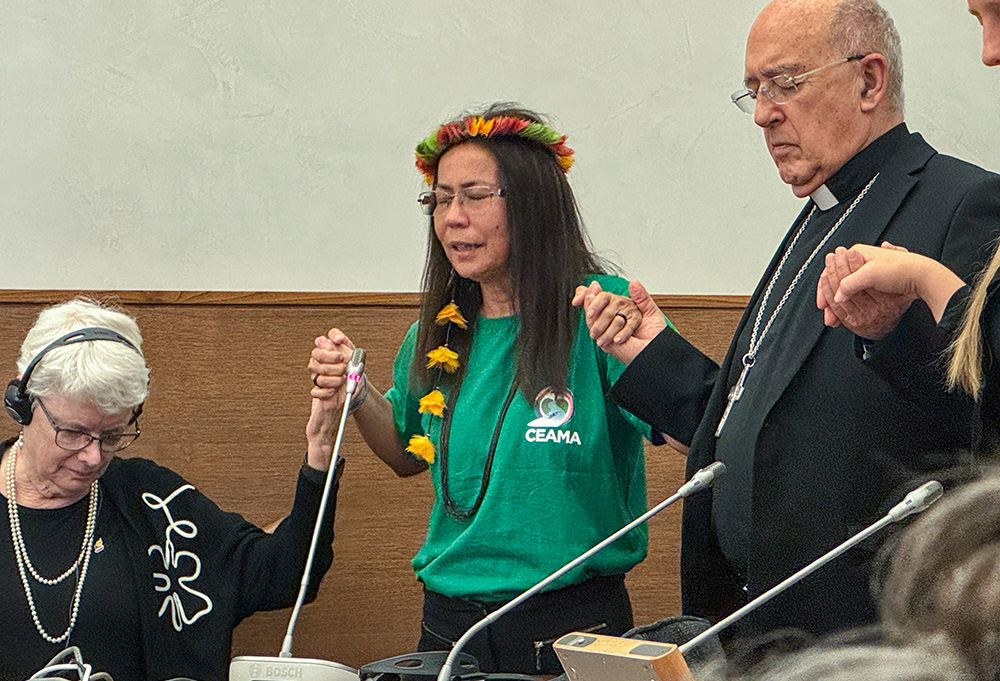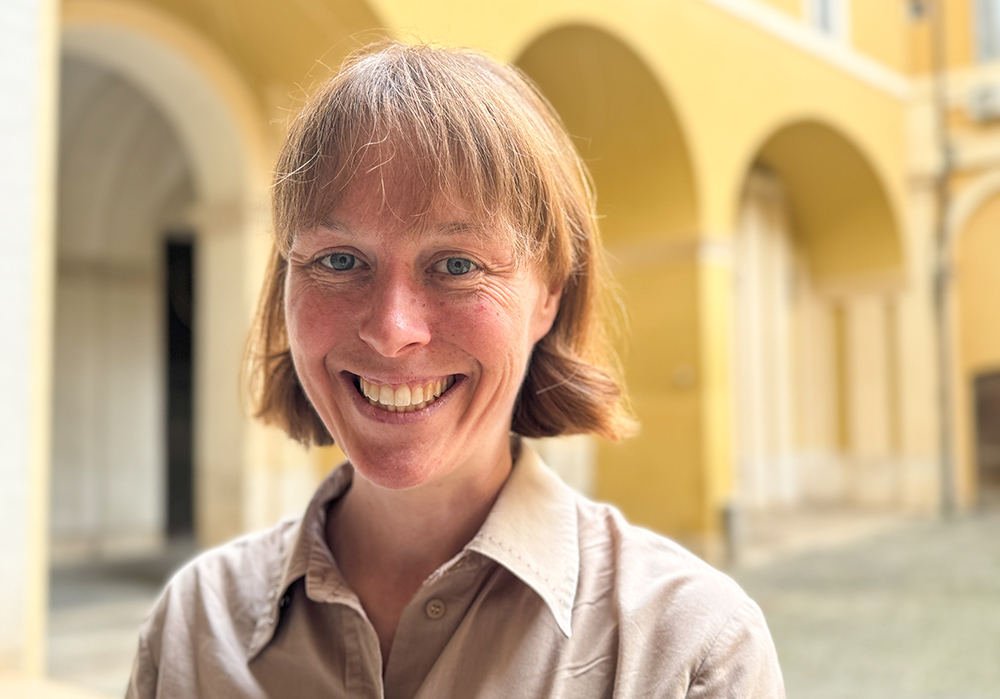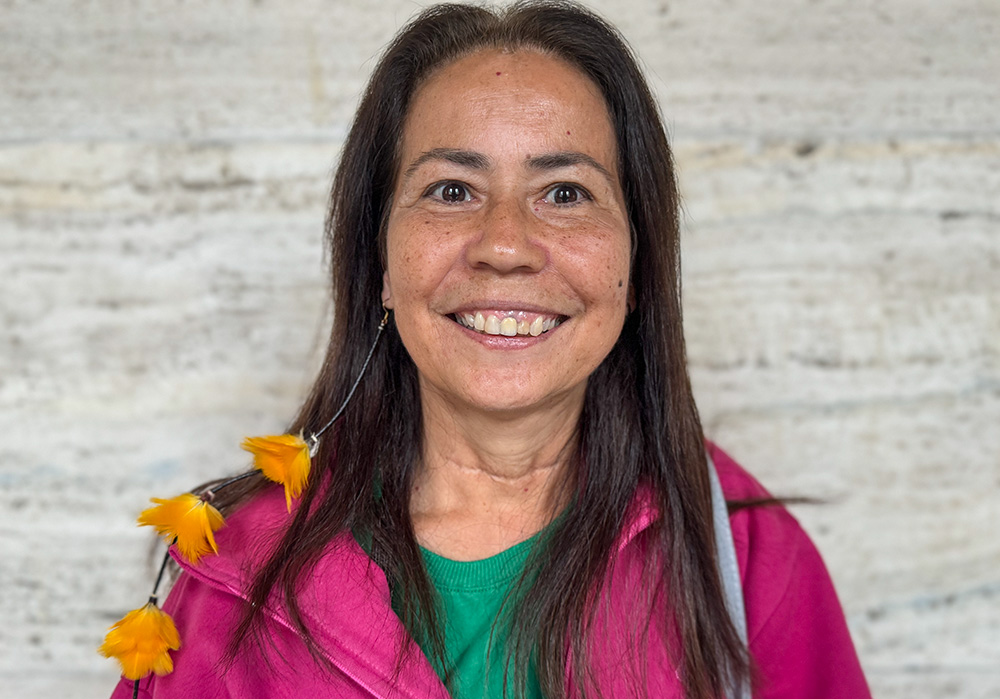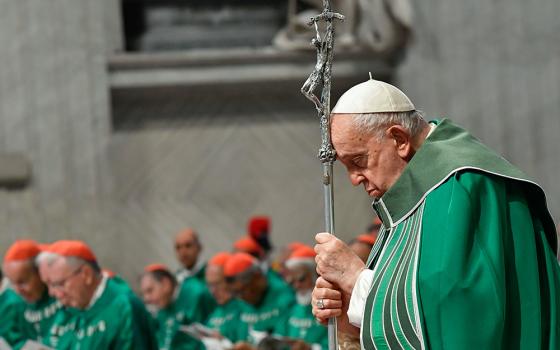
Franciscan Catechist Sr. Laura Vicuña Pereira Manso, center, leads a prayer Oct. 4 after a panel on synodality and ministry of women at Pope Pius XI Hall in Rome. Manso said tending to duties that would normally be performed by a deacon are part of daily life for some women religious since there are few pastoral workers in the remote region of the Amazon where she serves. (GSR photo/Rhina Guidos)
Some in the audience seemed surprised when Mercy Sr. Elizabeth Young mentioned, during a panel presentation on ecology, synodality and women on Oct. 4 in Rome, "Just last week, I had to conduct three funerals."
"Why is it possible ... how is it possible and not possible for other women?" someone in the audience asked.
"There are places already, within church teaching that allow — in exceptional circumstances, in very limited ways, and temporary sometimes — for this to happen," Young explained.
As a parish life coordinator and catechist in Wilcannia, rural Australia, population 745, Young takes part in pastoral and spiritual care, conducts liturgies, including Sunday celebrations, baptisms and funerals — all with the authorization of the local bishop — because there are neither deacons or priests to tend to the local population there.
"I've been ministering in places where no one else is, so no one's surprised. Everyone's just very glad that someone is there representing the church," she said.
The only surprise comes mostly from outside.
'I've been ministering in places where no one else is, so no one's surprised. Everyone's just very glad that someone is there representing the church.'
—Mercy Sr. Elizabeth Young
"So, I've heard that reaction from people in other places, but I've never had that reaction [from people she ministers to] because I think if you go where the gaps are, where there's no one already there, people are just so appreciative of having someone to minister with them, alongside them," she told Global Sisters Report. "It's very important to give credibility, for the people that we serve, especially that they know that this is authorized."
It's a familiar situation, too, for Franciscan Catechist Sr. Laura Vicuña Pereira Manso, who tends to Indigenous communities in Porto Velho, Brazil, part of the Amazon region. Along with Young, she shared her experiences at an event co-sponsored by Discerning Deacons and the Ecclesial Conference of the Amazon, of which she is vice president.
Both groups have organized prayer and other educational events and dialogues focused on women in ministry during the Oct. 2-27 synod on synodality, which some of the gathering's delegates attended.
As the topic of women in the diaconate sparked debate at the start of the synod, the sisters joined other women in discussion about how some of them already take part in diaconal duties, as laity but also as women religious.
Advertisement
"I live it in my daily life," Pereira Manso told GSR, of a ministry that also involves duties that a deacon might perform.
Some of it is modeled on what she watched her mother do as she tended spiritually to others in Rondônia, Brazil, a remote region of the Amazon where there were no women religious, priests or deacons at the time.
"My mother was a deacon, even though she wasn't ordained," Pereira Manso said. "She would provide formation for communities where there was no Catholic community. She would arrive and start formation for the community. When people were ready, she would go to another community. That's the vocation of service, to take the Word where it doesn't exist."
Now Pereira Manso has taken that a step further, advocating for the female diaconate.
"Our fight that we're taking on today is for future generations," she told GSR. "I don't think I'll be able to reap the fruits of this harvest. I think my role is to plant the seeds."
She doesn't have a calling, in any case, for the diaconate, she said.
"A lot of people think, 'Do you want to become a deacon?' No. But I know there are women, many women who have that vocation. We speak up for them."

Mercy Sr. Elizabeth Young, of Wilcannia, Australia, poses for a photo after a panel at Pope Pius XI Hall in Rome Oct. 4. She shared her pastoral and spiritual experiences, conducting liturgies, including Sunday celebrations, baptisms and funerals — all with the authorization of the local bishop — since there are no other pastoral agents in the area. (GSR photo/Rhina Guidos)
Young, the Australian Mercy sister, however, said there's something about the diaconate that calls to her.
"Being a sister is a great privilege, and I represent something bigger than myself. I belong to a community," she said. "I think the call to consecrated life and the call to ordained ministry can coincide."
Ministering to families at baptisms and funerals "is such a privilege," she said.
"This is one of the highlights of my ministry, because you're connecting with people who you might have connected with pastorally, but now in a liturgical space. You're bringing the full weight of the nourishment of history, ministry, ritual, that's beyond any single person. The spirit is present in a way that's so different than in other ways," she said.
For Pereira Manso, advocating for women in the diaconate also is personal.
"I have a sister, a blood relative, who does have a vocation. But to live out her vocation, she had to go to another church since the Catholic Church still does not have ordination of women deacons," she said. "So, I feel called to amplify the voice of women who have this vocation. That's why I say my role is to sow, to plant."

Franciscan Catechist Sr. Laura Vicuña Pereira Manso, of the Ecclesial Conference of the Amazon, poses for a photo Oct. 4, 2024 after a panel on women, synodality and ministry of women at Pope Pius XI Hall in Rome. (GSR photo/Rhina Guidos)
For Young, her glimpse into the sacraments has opened a new spiritual window.
"The Spirit is present in a way that's so different than in other ways," she said.
In prison ministry, for example, "it was one thing to have a pastoral care role, but when you took people into that space of ritual, new things opened up. People were able to forgive others; they weren't able to forgive before. They were able to find healing for grief and loss in their life. It's really special."
"The tangibility of our sacraments," she continued, "it touches people in a way that words don't, because there's the sacramentality of our ritual life. To be able to share that with people is extremely special."
Tending to families at a funeral, for example, has been special because one finds "the riches of the person's life and to be able to share that, and to share that in a way that brings together the prayer, the ritual, the uniqueness of people, and the solidarity we have as a community," Young said.
At times, her draw toward that ministry is unexplainable, she said — something that was apparent from a young age. As her mother recalled to Young, when Young told her she felt the call at age 7, the same year she became Catholic, her mother asked her why she wanted to do that, thinking it must be related to fancy dresses.
"I said, 'I don't know. I just want to,' " she recalled. "That's how I knew it was a call. ... But it's something that, just like the later call to religious life, it just keeps coming. It doesn't go away. It's a Holy Spirit thing. It's very hard to explain."
It's a yearning that continues to this day, she said.
"Even when you try and go in different directions, it keeps coming back. Even the different things that I've done professionally, as a sister, I've ended up coming back into roles that look much more like what the diaconate might look like," she added.
For those with that yearning, Pereira Manso said she will continue to fight to keep the door and discussion open. Even as Pope Francis and other Vatican officials have recently nixed the idea of women deacons at this time, Pereira Manso said she believes the best hope comes from women in peripheries, where the church has no other choice but to allow them to participate.
"Let's not lose hope," she told the audience listening to the women at the panel. "The door is not closed."








